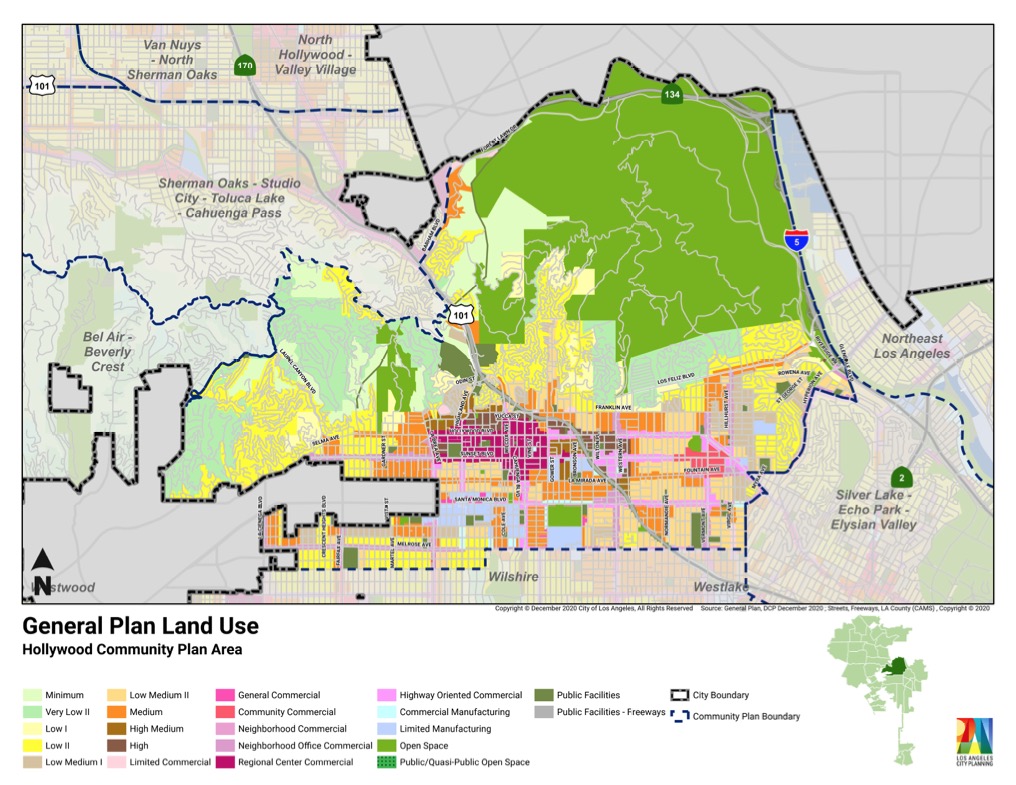Comments
PLANNING WATCH LA - The current Hollywood Community Plan dates back to 1988. Since then, in 2012, a second Hollywood Community Plan, including its Environmental Impact Report and Implementing Zoning Ordinances, were completely rejected by Superior Court Judge Alan Goodman. Instead of appealing his ruling, LA’s Department of City Planning chose to prepare a second Hollywood Community Plan Update while it followed Judge Goodman’s order to reinstate Hollywood’s 1988 plan. City Planning completed this second update in early 2021, when the City Planning Commission approved the new plan, its implementation ordinances, and its Environmental Impact Report.
This City Planning Commission transmitted this entire package to the City Council on August 19, 2021, where it has languished for one and half years. We do know that a key cheerleader of the urban growth machine behind this plan, the Los Angeles Times editorial board, is not a happy camper. The Times claims that if the City Council fails to immediately adopt the pending updates for Hollywood and Downtown Los Angeles, the entire process must begin anew.
Only the fly on the wall knows for sure what is really going on, but I suspect that the City Council fears that that pending Hollywood Plan, like its 2012 precursor, will be subject to successful lawsuits. And, the City Council must also realize that the draft 2020-21 Hollywood Plan needs to be revised so it includes 25 zoning implementation ordinances in the Downtown Community Plan.
What I do know, though, is that the pending 2020-21 Community Plan is just as flawed as the 2012 version overturned by Judge Goodman. He found that the 2012 Update was fundamentally and fatally flawed for three reasons:
- It was based on outdated demographic data.
- It failed to expand municipal services and infrastructure to serve existing and future residents and buildings.
- It did not consider its EIR identified environmental impacts.
This is why Judge Goodman rescinded the updated Community Plan text, EIR, and implementation ordinances.
Building on Judge Goodman’s 2013 decision, I identified ten similar errors in the pending 2020-21 Update. They, too, warrant its rejection.
1) The 2020-21 Update conflicts with the 1995 General Plan Framework Element. This General Plan Element is explicitly growth-neutral, while the pending 2020-21 Hollywood Community Plan Update is deliberately growth-inducing. Its rationale is that its extensive up-zoning, which it misleadingly calls rezoning, promotes new, luxury, transit-adjacent apartments while also reducing homelessness and increasing mass transit ridership.
2) The pending Update fails to calculate the buildout of existing zoning, as well as consider proposed Hollywood projects with approved entitlements. Together these approvals more than meet the State of California’s amended RHNA (Regional Housing Needs Assessment) targets for Hollywood, without the need for any up-zoning to meet the State’s imposed RHNA goals.
3) The pending Update does not include a monitoring program. It, therefore, has no mechanism to determine if its demographic assumptions are accurate, if Hollywood’s infrastructure and services meet existing and future user demands, and if the Plan’s implementation ordinances produce their intended results.
4) The pending Update utilizes 13 year old population data. Depending on the actions of Hollywood’s new Councilmember, Hugo Soto-Martinez, the 2020-2021 Update could go before the Planning and Land Use Committee (PLUM) and full City Council in 2023. If this happens, it would be 13 years after the Bureau of the Census collected 2010 baseline census data, and City Planning augmented this data with a population forecast from the Southern California Association of Governments (SCAG). Nevertheless, City Planning’s 2040 population forecast exceeds SCAG’s 2040 Hollywood forecast by 17,000 to 48,000 people. This growth forecast is ironically called “Reasonable Expected Development” even though LA‘s population, like Hollywood’s, is declining. In fact, Hollywood has continually lost population since the 1990 census, and Los Angeles has so far lost 200,000 people during the ongoing Covid-19 Pandemic.
5) The pending Update does not address Hollywood’s inadequate municipal services and infrastructure. The plan’s Environmental Impact Report indicates there would be no upgrades to Hollywood’s infrastructure, including water and electricity. The dubious rationale for this is that new development will be located in Hollywood neighborhoods with excess infrastructure and public services capacity. As for data that substantiates this claim, I could not locate it in the draft Update or its EIR.
6) The pending Update ignores environmental impacts. Every major project, including the draft Hollywood Community Plan update, has serious environmental impacts, such as Green House Gas emissions, that can only be mitigated by fundamentally redesigning the project. This option is called the Environmentally Superior Alternative. In this case, the Update’s DEIR calls this option the Reduced Transit Oriented Development and Corridors Alternative. Since the Update version that the City Council might consider in 2023 rejects this alternative, it must adopt a Statement of Overriding Considerations.
Based on previous Statements of Overriding Considerations, the City Council will claim that the updated Hollywood Community Plan generates so many new jobs, low-income housing units, and/or transit trips that it can safely ignore its serious environmental impacts. Considering Hollywood’s increasing homeless population, high vacancy rates in mostly new apartment buildings, declining transit ridership, and unrented store fronts and offices, this Statement would be fact-free.
7) The pending 2020-21 Update is improperly sequenced. It should follow, not precede, the updates of the General Plan’s mandatory and optional citywide elements. The draft Hollywood Community Plan Update also makes frequent references to the 28 year-old General Plan Framework Element, while other critical General Plan elements, particularly the Infrastructure and Public Services elements, are more than 50 years old. City Hall should thoroughly update the citywide General Plan elements before its adopts Community Plan updates that supposedly apply the entire General Plan to local communities.
8) The pending Update conflicts with the General Plan. The 2020-21 Update repeatedly claims it is consistent with the General Plan. But the General Plan Framework Element is growth neutral, not growth-inducing. It contains two criteria for future amendments and ordinances that increase planned and zoned capacity. First, these proposals require evidence that existing zoning cannot meet the needs of future Hollywood residents. But the Updated Hollywood Plan and its DEIR does not contain this information. Second, the proposed up-zoning ordinance must also document that LA’s infrastructure has excess capacity to meet the needs of an expanded Hollywood population and built environment. I could not locate any data in the pending Update or its EIR that support this claim.

Proposed Update increases the density of Hollywood’s core, but not the infrastructure to serve these new residents and buildings.
9) The pending Update conflicts with zoning buildout figures. The Update implies that Hollywood’s existing zoning cannot support projected user demand, and therefore it, therefore, must be up-zoned. But Hollywood has an abundance of underutilized zoning, mostly commercial lots on transit corridors that are already zoned for R-3 and R-4 apartment buildings, many of which have been previously approved. In fact, Hollywood’s existing zoning allows its population to double, reaching 470,000 people. This is 264,000 more people than SCAG’s 2040 population forecast. If Accessory Dwelling Units and Transit Oriented Community Density Bonuses are then factored in, Hollywood’s population could reach 630,000 people without any zone changes. This is 426,000 more people than SCAG’s 2040 forecast, and 366,000 more people than City Planning’s 2040 Reasonable Expected Development population forecast. Therefore, there is no reason for the Update to include a 96 page up-zoning ordinance and a companion 95 page Community Plan Implementation Ordinance, other than to create windfall profits for real estate developers and speculators.
10) The pending Update does not contain a monitoring program. The General Plan Framework, frequently referenced in the current Update, requires City Planning to establish a General Plan Monitoring Unit that would prepare and distribute annual General Plan monitoring reports. Without these reports, it is impossible to determine if the pending Update’s 146 implementation programs exist and if they meet the Update’s goals. Furthermore, the Update is based on assumptions about population, housing, and employment. Without careful monitoring, it is impossible to know if these assumptions are correct and if the pending Update’s implementation programs should be amended.
Conclusion: In 2013, when Judge Goodman ruled that the adopted Hollywood Community Plan was fatally flawed, he exposed City Hall’s misuse of Community Plans to increase commercial real estate profits through up-zoning. The current Hollywood Community Plan Update shares this same agenda, and it should expect the same fate. If it is not replaced by a revised plan that reflects the actual demographic conditions in Hollywood and the needs of its residents for better infrastructure and public services, City Hall should brace itself for another defeat at the hands of Hollywood residents and their supporters.
(Dick Platkin is a retired Los Angeles city planner who reports on local planning issues for CityWatchLA. He serves on the board of United Neighborhoods for Los Angeles (UN4LA). Previous Planning Watch columns are available at the CityWatchLA archives. Please send questions and corrections to [email protected].)
















